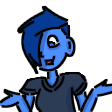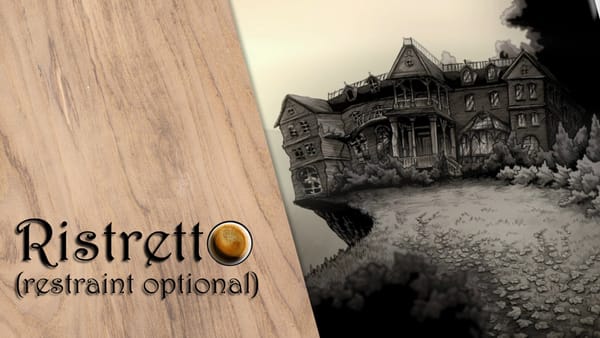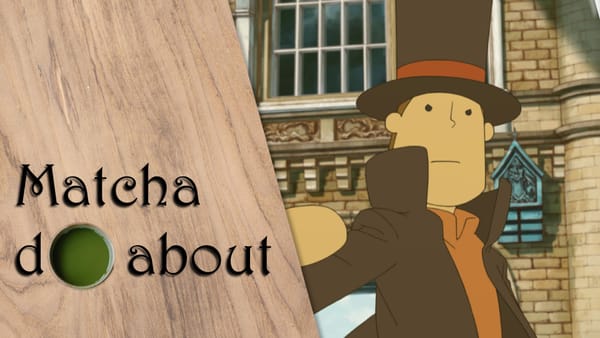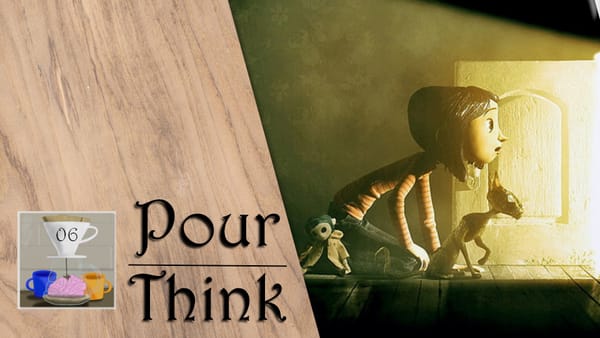2024 (in Books)
Happy New Year! Mischief promised to share the books that they've read in 2024 - and here they are. From theory to fiction, from silly to serious - and the occasional sprinkle of horror.
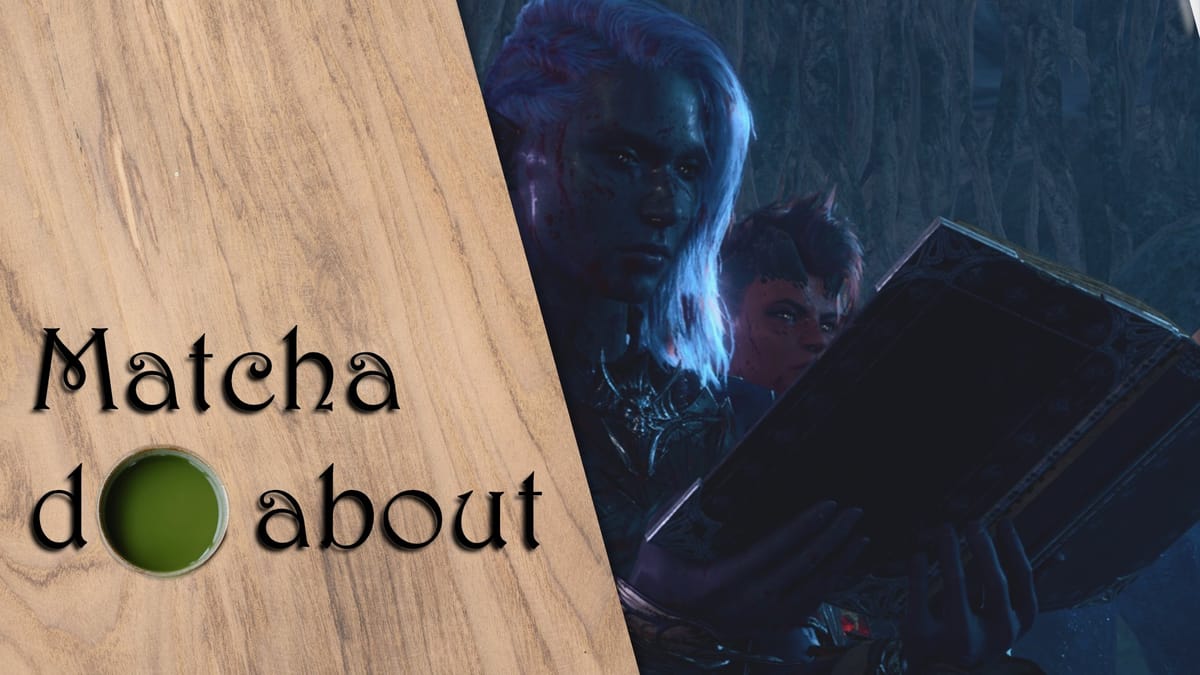
Just a few months ago, the topic of ‘reading as a hobby’ had kept me quite enthralled. I shared some of my thoughts and ended my initial post by stating that I’d be sharing the books that I’ve been reading all throughout 2024 as well.
So, here I am with my list of books that I've actually read throughout 2024. It had been quite the fun time overall - and I've actually quite enjoyed the mix of books that had been on my 'list' for years and completely new finds.
The list will be structured in the order that I've read them and include the answers to three main questions: "What is the book about?"; "Why was this book on my radar?"; and "Why this score?".
I wasn't sure at first if I should include any ratings, but they ended up providing a decent jump-off point. However, my ratings are heavily subjective and do not function as an overall statement of quality for any of these books.



Non-Fiction (Horror, Queer Theory)
What is it about?
This is quite the collection of twenty-five personal stories, all from authors within the queer community. Each author writes about their thoughts and experiences through the additional lens of a specific horror movie, with either its plot, or characters functioning as a reflection of their own selves.
Why was this on the radar?
This book was a recommendation from an ex-work-colleague of mine. We used to study the subjects at university and we both shared an interest in horror theory and queer studies. Thus, we often found ourselves discussing recent book finds. It’s been on my “should-read” ever since.
Why this score?
Overall I enjoyed reading this anthology, though, I did not enjoy every chapter in itself. There were some amazing essays in there, some that I thought were rather interesting, and some that I didn’t like that much; Sometimes the link to their ‘movie of choice’ seemed flimsy at best; sometimes I just did not enjoy the writing style as much. However, I enjoyed the diverse profile, the many differences and similarities showcased and present in the anthology itself.
I’d say the ‘good’ and ‘great’ essays still highly outweigh the number of essays that I didn’t like.
My favourites:
- “A Demon-Girl’s Guide to Life” by S. Trimble
- “Both Ways” by Carmen Maria Machado
- “Centered and Seen” by Sumiko Saulson
- “The Wolf Man’s Daughter” by Tosha R. Taylor.
- “On Beauty and Necrosis” by Sachiko Ragosta

Non-Fiction (Feminism, Philosophy)
What is it about?
This is an analysis on the abuse of power with a focus on the field of academia. Ahmed examines the systems that the institution uses to “stop complaints”. It showcases the many ways that are still used to hinder people actually being able to get their complains through.
Why was this on the radar?
While I’ve never studied philosophy or psychology, I am still really interested in learning more about it whenever I can. One lovely source on philosophy is Abigail Thorne’s youtube channel “PhilosophyTube”. There she’s been covering a range of contemporary topics in a truly approachable and honest manner. In November 2022, Abigail posted her video titled “I Emailed My Doctor 133 Tunes: The Crisis in the British Healthcare System”. There, Abigail would cite Ahmed’s as a book “[that] is all about how making complaints to institutions reveals the way they really work" (17:40 – 45).
I was able to find a copy of the book at the end of 2023, and I’ve decided that I wouldn’t let it remain unread on my shelf for much longer.
Why this score?
The book is both, truly fascinating as well as simply horrifying when being confronted with such blatant abuse of power.
Stylistically, I have to admit that some of its choices were not appreciated by me. I do not enjoy it when a text keeps hinting at an argument, without actually presenting its point. It seems like a taunt to me: "Oh, the thing I mentioned here? Yes, we will talk about it in about three chapters […] we will talk about this thing in like two chapters […] we’ll actually examine it soon, sure!".
However, the research and work Ahmed put into this work is staggering and I’d say it’s still a must read book if one is interested to learn more about the purposefully complicated system behind complaints, as well as their overall failure to actually provide meaningful aid to those who wish to complain.

Non-Fiction (Horror, History)
What is it about?
It’s a book that contextualises a multitude of fictional works to the horrors experienced during the first world war.
Why was this on the radar?
I tend to browse book stores and pick up whatever I think looks interesting or put it on a list of “potential reading material”. This book I must have come across while looking for more books on the topic of ‘horror history’. Fictional horror is heavily tied to our history, and thus, an understanding of one helps with the other.
Why this score?
The book is able to provide a lot of information and a pretty clear timeline overall. However, I don’t fully agreed with some of his arguments and claims; Sometimes I feel like the need make an element fit ‘better’ into his thesis meant that something else that was equally of importance was then lost in translation.
One additional point that I feel like changed my perspective on the book just slightly, was how… Americanised it had felt in certain parts. It is distant in a way that I had not been used to when talking or reading about these wars. Personally, a lot of my education on this topic focused on more localised writings; And thus, some elements of this book just seemed off to me.
This is to say that it still is a great means to learn more about the topic of war and horror through a pretty focused lens; The thesis has a lot to stand on and the perspective provided through W. Poole, as a historian, is not something to be immediately discarded.
However, if one is more interested in a more… encyclopedic approach on horror history – and is fine with a less narrow lens – then I’d recommend Jess Nevins’ book “Horror Fiction in the 20th Century” over this.

Non-Fiction (Horror, Fashion)
What is it about?
It’s another collection of essays, this time focusing on the many visual representations of monsters and horrors in both literature and film. What are the fashion choices of the local monster and why is this significant?
Why was this on the radar?
This book must have made it into my collection while I was working on a film analysis paper years ago. Probably. Maybe? Potentially, I just thought it’d be interesting to see how the visualisation of the ‘horror monster’ in film had changed throughout the years.
I remember that I deliberately wanted something that was removed from any war related topic after having read ‘Wasteland’.
Why this score?
It was pretty good. There was a surprising amount of information about wedding dresses, funnily enough. Overall, the book certainly delivered on its promise and each essay managed to make its arguments pretty clear. I do wish there would have been more to it, though. It felt rather short and add to this that there were multiple essays focusing on a similar topic (wedding dresses)... it just felt like the book should have included maybe two more essays. Lastly, I had expected something slightly more technical and encyclopedic than what I had gotten.
Still, it’s a great read and I’d especially recommend these essays:
- “'Their Tattered Mortal Costumes Will Afford Them None of the Answers They Seek' Clothing Immortals in the Works of Anne Rice, Tanith Lee, and Angela Carter” by Stephanie Bowry
- “Fashions from Hell: The Enduring Influence of Jack the Ripper on Dress” by Alanna McKnight
- “Horrific Transformations: Costume, Gender, and the Halloween Franchise” by Nadia Buck and Alexandra Heller-Nicholas.

Fiction (Horror)
What is it about?
It’s a horror anthology, kind of.
“A dinner party is held in the penthouse of a multimillion-pound development. All the guests are strangers - even to their host, the billionaire owner of the building. None of them know why they were selected to receive his invitation. Whether privileged or deprived, besides a postcode, they share only one thing in common - they've all experienced a shocking disturbance within the building's walls.” (Book Blurb)
Why was this on the radar?
...It’s written by Jonathan Sims.¯\_(ツ)_/¯
I've been a fan of Jonny's other work already (The Magnus Archives, The Mechanisms), so when I've heard that he would be publishing a book? Yeah, sure. I'll read that. At some point.
Why this score?
I'm biased. I can't help it. I truly enjoy the way Jonny writes horror.
Contemporary horror? Jonny's your guy!
The individual stories that make this anthology were all brilliant; Covering a large range of horror-topics, which were all confined within one ‘giant’ building location: “Banyan Court” in the middle of London. What I enjoyed most about this book must have been the range of protagonists, none of them fell flat.
The fact that all of these stories then led to an overarching conclusion?
Love it. Expected it.
I absolutely do recommend this to anyone that enjoys contemporary horror and likes anthologies. (Also... I do recommend listening to the Magn-)

Fiction (Mystery/Crime)
What is it about?
It’s a collection of stories about the character Arsène Lupin and his escapades.
Why was this on the radar?
Due to my year-long interest in Sherlock Holmes I had always had some awareness about the character of Arsène Lupin. The constant mention of the gentleman-thief in Persona 5, as well as the final push from Sherigan while talking about PourOverThink caused my interest in the books to skyrocket and finally managed to get me to read another classic.
Why this score?
Since Sherigan and I ended up talking about Lupin already, I'll be keeping this short...
It’s a fun read! Personally, I thought it fascinating to look into a character after I had already made my assumptions about the guy. Some aspects were pretty neat, some I thought were slightly lacking – but I enjoyed the ride.

Fiction (Mystery/Crime)
What is it about?
More escapades! However, this time Arsène gets to prove himself against the best of the best. Sherl- uhm… I mean… Herlock Sholmes!
Why was this on the radar?
Same as the above.
Why this score?
I do enjoy a good ‘versus’ story, and this book delievers in many ways! These confrontations between Sholmes and Lupin were well thought out and had enough intrigue to keep me interested. However, I do feel like there were certain mischaracterisations present that really dulled my enjoyment. Nevertheless, I still think the book is worth checking out, especially, since they’re easily accessible through the Project Gutenberg.

Non-Fiction (Feminism, Queer Theory)
What is it about?
Butler’s book examines the ‘anti-gender movement’, which is against transgender rights and any concepts behind “gender”. The book covers how ‘gender’ and ‘gender ideology’ have become a phantasm.
Why was this on the radar?
During my years at university, I’ve often come across Butler’s work regarding the “performativity of gender”, a concept introduced in the aptly titled essay “Performative Acts and Gender Constitution: An Essay in Phenomenology and Feminist Theory”. I also remember one of my professors mentioning how such a theoretical approach has its uses, but that there are nuances to these issues that couldn’t be covered in a paper published in the 1990s and that gender studies is a topic that is always undergoing changes due to how our perception of gender itself was constantly changing. This always stuck with me.
Thus, when I heard that Butler was about to release another work in 2024, I had been immediately intrigued.
Why this score?
I’ve enjoyed reading this book quite a bit. It examines the current rhetoric used against the LGBTQA+ community, how conservative rhetoric created a phantasm, something to truly fear, if ‘gender’ is simply mentioned. It provides an interesting overview on the different approaches used to demonise transgender people who just want to live.
It’s informative, certainly, but it also was quite dense to read. I wasn’t surprised about this, since I’ve read Butler before, but it might be off-putting for those that are not used to this kind of writing. A certain level of understanding is always expected. I wouldn’t suggest this as something for someone completely new to Butler’s writing.

Fiction (Young Adult, 'Horror')
What is it about?
This is the story of Coraline Jones, who after moving into a new flat finds herself slowly falling into the web of another being – someone that is ready to devour her if Coraline doesn’t manage to escape.
Why was this on the radar?
I really enjoyed the 2009 movie by Henry Selick and had always considered reading the book at some point. Sherigan and PourOverThink providing the final push early in 2024.
Why this score?
The story is paced in a way that works great as a bed-time story. However, if you’re simply reading this as a story in itself, it feels weirdly lacking. Then again, it might just be my familiarity with its movie adaptation; But like I had mentioned in the respective podcast episode, this is probably the one and only time I’d argue that the movie was better.
The book is still good. There are some interesting details that had been omitted and for a fan of the movie and the lore... However, I do also think that as an adult you’ll have a better experience watching the movie.

Fiction (Crime-Thriller)
What is it about?
“The serial killer isn’t on trial. HE’S ON THE JURY” – “The murder trial of the century is here. A ruthless prosecutor, A brilliant defence lawyer. A defendant with a secret. And a serial killer on the jury…” (Book Blurb)
That's what the book WANTS you to think it's about. It's written on the cover, which means it MUST be true, right?
Why was this on the radar?
I came across this book while on the airport waiting for my flight to Ireland back in early 2023. Crime Thrillers have been a vice of mine since my teens and there have been moments where I found myself on the lookout for something to scratch that itch. The cover and the premise of the book looked interesting enough for travel literature and I ended up taking it with me.
(As it turns out, this was part four of a series, something which I hadn’t known until I searched for it on Goodreads.)
Why this score?
A personal gripe of mine is first person narration (a bit hypocritical considering the format of this article, I am aware). Now, we add to this that I truly did not enjoy reading the perspective of the killer in this novel. It felt weirdly forced in a way that I had considered to leave this book unfinished multiple times. However, I did more or less enjoy the perspective of Eddie Flynn, the ex-conman turned lawyer. He is also the protagonist of this series and he at least had some personality.
I feel like my issue with this book was that I had once again expected something completely different. This was not a legal thriller located mostly in one room following the rules of Aristotelian theatre, but instead this was a book that could have been a crime show with every few chapters covering an episode. It felt like I was reading something that tried to surpass its previous chapters with something even bigger to consider.
My biggest disappointment remains the fact that the elements of the actual court case were seemingly the smallest part of the novel. The book itself had been a lot more fun after I’ve come to terms with what it had to offer. It’s the sole reason I even finished reading the book itself.
I am weirdly intrigued in the series itself. Eddie Flynn managed to kind of endear himself to me in a weird wet cat, kind of way. I’m not sure it’s enough to give another book of his series a go... but maybe they’re more fun if I simply see this as another version of “The Mentalist”, who knows?

Fiction (Horror)
What is it about?
It’s about death, grief and holding on to memories? Kind of, at least.
Diya Burman’s best friend and housemate died suddenly, which left her feeling adrift. The book picks up shortly after these events with Diya now working for a cleaning company that cleans up after the dead.
Why was this on the radar?
After having truly enjoyed Thirteen Storeys before, I had no issue looking into Jonny’s other novels. And this time it’s not an anthology? Certainly interesting.
And yes, I saw this as a potential palette cleanser after Thirteen, sue me.
Why this score?
There is something so refreshing after a few books where your expectations were not met to find a book that just… is what it says it is? Do not misunderstand me, the book still managed to surprise me and kept me engaged, but unlike the previous few entries it felt more aligned with what I wanted to read in the first place. There were no skewed expectations.
Personally, I preferred ‘Thirteen Storeys’ over this work; Mostly because I truly had enjoyed the setup of Banyan Court. However, I do feel like this book nicely covers the subjects of death, of grief and memories, as well as the thoughts of being left forgotten. It’s not too much philosophy, but more a rather dry take on what we all know and fear when thinking about death. The addition of these horror elements simply makes the topic a lot more palatable for the reader.
Lastly, I really enjoy the way Jonny writes his characters. In a way, this story is so down to earth, with its characters being just people. They’re flawed and that’s normal. They struggle and that’s normal too.

Fiction (Fantasy, Queer)
What is it about?
This covers the story of Brian, a recently turned werewolf, and his attempt at finding his place in life.
Why was this on the radar?
I have to admit, I judged this book by its cover. This simply screamed "campy" at me and while I haven't really read much camp before, I found myself truly intrigued by it.
Why this score?
Well, the cover really didn't lie. Bored Gay Werewolf is exactly what you’d expect. I picked up this book thinking it might be a bit camp - It was. It was great.
The story is rather character driven and covers a lot of Brian's emotional struggles to actually connect with people. It was refreshing to have something so openly queer focusing quite a bit on friendship and finding your pack.
My main 'issue' with the book would probably be that certain elements simply felt a bit rushed. I would have loved to learn more about certain characters and maybe have the resolution of it all take just one additional chapter? But at the end of it all, it still felt fitting considering the overall tone of the book. It is also implied that this will be part of a larger series, which is something I'm actually looking quite forward to.
Though, I do think the more casual tone might not be for everyone, I certainly enjoyed my time with the book.

Fiction (Non-Fiction, Horror)
What is it about?
It's a story about a house.
No, wait. It's a story about a documentary.
No... it's the story about a guy finding a manuscript of an academic paper written by another guy, which was meant to be an analysis of a documentary, which had been created to record the happenings at the filmmaker's house?
Why was this on the radar?
I've had heard of the book before, but I only really thought about reading it after coming across another video essay covering the story of a Doom 2 mod: [myhouse.wad]. The video mentioned the 'clear' influences of Danielewski's work on this project and I found myself to ignore my growing interest. Moreover, since I've been more and more intrigued by the use of liminal spaces in horror.
Why this score?
I really liked this book. It was fun reading a completely fake academic paper, which still included so many real elements that I just have to compliment its research. It really reminded me of the good old days at university, especially my film classes. (I took way too many classes on documentaries).
However, I would also say that some of it included the worst paragraphs that I’ve ever had to read? I adored way the manuscript made use of its footnotes, and the way they were able to tell multiple stories at once. I have to admit that I was getting rather fed up with the amount of explicit sex. On a logical level, I understand why they’re there and what their function are supposed to be, however… I really do think my personal enjoyment of the book suffered A LOT from the amount of it.
Then again, to be fair - the first words the book gives me are "This book is not for you", so it's not like I can say it didn't warn me beforehand.
These mixed feelings reminded me quite a bit of C'est Arrivé près de chez vous (1992), one of my favourite mockumentaries that I can only recommend with multiple warnings attached to it. Also, props to the book for actually citing ‘C’est Arrivé près chez vous’ in its own ‘manuscript’ during one of its documentaries sections, that absolutely made my day.

Non-Fiction (Memoir, Death)
What is it about?
This book covers Caitlin Doughty's first job at a crematory and how working at that place has shaped and changed her own understanding of death.
Why was this on the radar?
Caitlin's work had reached me once again through my interest in Philosophy Tube, Abigail Thorne's youtube channel. This time it was the video "How Death Changes Your Perspective", which then would leave me morbidly curious. Add to this some funny title and a book that offers both serious and light-heartedness at once... And you've caught another reader!
This book was also Caitlin's debut back in 2014. She has since published three more works, which I might pick at some point as well.
Why this score?
There's a lot to love in this book. Caitlin certainly has a way with words, she brilliantly mixes in enough humour to even make the more morbid bits seem... less intense? Though, this doesn't mean that death as a topic isn't taken seriously. I felt like the book manages to get you to think and re-think about the way we as people try to cope with death and how we might have accepted the death industry in its current state.
However, I do have to admit I hadn't realised that this would turn out to be a memoir, of sorts. I had more or less assumed something slightly more focused on actual questions that would then amount to the lessons of a crematory, as the title suggests. While mostly my fault, it skewed my initial reception of the book - With this different approach also came a differing writing style, which I had to get used to.
Overall, I still thoroughly enjoyed reading the book and learning more about death, as well as Caitlin's early journey at the crematory.

Fiction (Historical Fiction, Vietnam War)
What is it about?
This is a collection of short stories about an American military platoon during the Vietnam War. It's based on O'Brien's experiences as a soldier, though, these stories remain fictionalised.
Why was this on the radar?
It was a mixture of things. Another set of video essays, another set of video game plots, and another sudden urge to learn more and read-up on a topic I was rather ignorant about.
As a non-American, we've never covered this history of war as in-depth as we've covered Europe's history - and the little bits that I was once taught were rather spotty at best. Originally, I had been looking for a few non-fiction pieces, but then I was recommended Tim O'Brien's work.
Why this score?
This collection of short stories manages to capture an essence of war that I haven’t really seen often on paper. There is a sense of brutal honesty while completely changing facts and names as a means to actually make the reader understand war.
It is brilliantly written. All of the short stories are still linked together, which means that they're message still rely on one another. However, I would say that one of the main messages told through this book is explained in "How to Tell a True War Story" and "Good Form", which both talk about the way people tell these stories and how one has to change them to make others better understand their meaning.

Non-Fiction (Politics, History)
What is it about?
Ilan Pappé and Noam Chomsky, two leading voices in the struggle to liberate Palestine, discuss the road ahead for Palestinians and how the international community can pressure Israel to end its human rights abuses against the people of Palestine. (Goodreads)
Why was this on the radar?
Published in 2015, this work has remained relevant to this day. I've had this book on my to-read list for a while, but it took me a bit to find a good copy. I am probably one of many who has picked up this book out of an interest to educate myself further on the topic.
Why this score?
Rating this book felt... weird. At the start I stated that I'd note this to gauge my "enjoyment" of a work. This was the first time I really can't say that it's been "fun". I even considered removing it from this list since it seemed to be such an ill-fit. A more serious work, covering current events, in a list of mostly literary analysis and fiction works...
That's probably why it stays on the list.
This books is informative. It's also a dense read, which was expected. It covers about a hundred years of history and makes a clear argument: Israel's violence is nothing new.
My small gripes with the book were once again instances of repetition, though, that might be mostly due to its interview format, or simply because some essays would have to include similar argumentation to make their claims.

Fiction (Horror, 'Historical Fiction')
What is it about?
An author decides to rent a remote cabin in the woods, where he wishes to write... something - only to end up thinking quite a bit about Mary Shelley and her novel Frankenstein.
Why was this on the radar?
The last few reads had been covering heavy subjects. The decision to pick up this book was made when I realised that I wanted to take a break. I wished to read something that was more in my usual niche.
I was quite unaware of the actual contents of the book, it had been a book that Sherigan once gifted me. (Sorry it remained on the shelf unread for so long!)
Why this score?
I'm quite the fan of Shelley's Frankenstein. So it was a lot of fun reading about this fictional author actually heavily disliking the work and making his arguments known. Additionally, it was just the perfect time to read this, as I had started to work on the rewrite of my own Frankenstein-Narrative analysis for Wicked Weave.
Overall, the book sets its scenes really well, and the interplay between story, facts, and 'horror' works extremely well. It includes an array of historical facts regarding Shelley and the longevity of her novel. Though, they do seem to fall for some of the more common misconceptions, or at least the book makes no attempt at correcting those.
My main gripe with the book is that to me its ending fell flat. I don't want to go into too many details to remain spoiler free, but I do think that might just be because I've read too many texts analysing Shelley's Frankenstein.
However, it does not detract from the books main message, which I think was pretty well argued.
On another note, it has also been quite fun to realise how House of Leaves changed my own perception and appreciation of some funky book structures. The little flourishes and added details were a nice touch.

Non-Fiction (Videogame, Culture)
What is it about?
This is a book about Spec Ops: The Line, a video game shooter developed by Yager Development and published in 2012 by 2K.
More specifically, this book comprises one specific approach of analysis: to search for the intended meaning behind the game's subversive narrative. The author, Brendan Keogh recalls his multiple playthroughs of the game and documents his thoughts, as well as argues for the game's symbolic importance. It's a reflective reading of the narrative, as it is heavily tied to Keogh's own expectations and experience with other video game shooters.
Why was this on the radar?
Thinking on it, this book must have been on my to-read list for about a decade. I was always interested in video game analysis, and this book just seemed to be one of its kind. An actually published serious video-game analysis? One that many video essayists would at least mention whenever they're bringing up the game in question, Spec Ops: The Line?
It was one of those books that I wanted to experience for myself at some point, but never really went out of my way to get it (until recently).
Why this score?
As a means to ensure that everyone can follow the plot, and be familiar enough with the important events - Keogh ends up summarising each event of the game, while also specifying where one could (and should) infer meaning from. However, if one is already familiar with Spec Ops: The Line's narrative, then all of this might just seem a tad too repetitive.
Generally, my expectations were once again working against me. While still an interesting read, I do feel like that it remained rather light on the actual analysis. This was probably due to this inherent attempt to extract as much symbolic meaning as possible from only the game's narrative, which meant that it felt more like a surface reading than a more 'critical reading' like the title suggested.
On a tangential note - It is intriguing, to me, that this approach to find the narrative's intended meaning has since lost its appeal to Brendan Koegh as well:
In an entirely cliche writer way, I actually don't really like Killing is Harmless anymore! Not long after I wrote it I went and read a bunch of Susan Sontag and got way into phenomenology and now I look back at my whole 'reading into' of the game on a symbolic level and I just sort of cringe. But I don't think not liking my old writing is a justifiable reason to not make it accessible, especially when so many people still seem to get a lot of value out of it. (Brendan Keogh, on Itch.io)
I think that If I actually read this book a decade ago, I would have probably enjoyed it a lot more than I did now. Nevertheless, I, too, am glad that the book is still available. It can be a good starting point for people, and it was nice to finally read the work that inspired many to actually recognise video games as a worthwhile text for analysis.

Fiction (Graphic Novel, Fantasy)
What is it about?
Anyone who had watched Gravity Falls years ago, knows what happened to the main antagonist Bill Cipher, right? ...right? △
The book of Bill is all about Bill. It's his chance to tell his story...
Why was this on the radar?
I really liked Gravity Falls back in the day, and when I saw this book trending I ended up intrigued. Funnily enough, my local bookstore forgot to check if they actually had the book in stock... This meant I absolutely forgot about having ordered this months ago until it was suddenly at my doorstep in December.
Why this score?
I like Gravity Falls, and I like absurdist horror. This book actually managed to be rather entertaining. The Illustrations and design choices for the book-pages were top-notch.
While it's been a while since I've thought about Bill Cipher in any capacity, the book really managed to capture his essence. Naturally, this also includes world-building additions for the Gravity Falls universe, which was quite fun. We also hear more from the Journal's author, and some hidden backstory, which is exactly what one can expect from any Gravity Falls media.
The book is simply silly, but in a good way. However, you won't get too much out of it if you're not a fan of Gravity Falls.
L HQGHG XS UHUHDGLQJ IRUG'V MRXUQDO WRR, RYHU WKH KROLGDBV. KRZHYHU, L'OO EH NHHSLQJ WKDW RII WKLV OLVW. LW'OO EH RXU VHFUHW, RN?
And that's the end of my list! I hope some of these caught your interest, or maybe reminded you of a book you had planned on reading anyway?
On my end, I've decided against a reading goal for 2025, because by now I'm just done with outside pressure. I like reading for fun, and that's what I'll continue to do in 2025.
And feel free to pitch me books in the comments; I do like to expand my to-read list (and then actually work through it).

